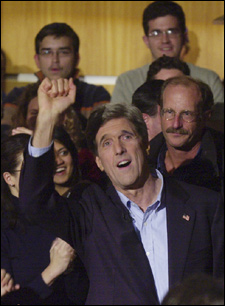One on One: Kerry defends Iraq stance
Senator underscores complexity of foreign policy issues

This is the second in a series of interviews with Democratic presidential candidates.
Massachusetts Sen. John Kerry, the second of the Democratic presidential candidates to appear live on MSNBC’s “Hardball: Battle for the White House” from the Kennedy School’s John F. Kennedy Jr. Forum, defended his controversial vote last year granting President George W. Bush the right to invade Iraq.
“It was the right vote, but the president did it in the wrong way and is still doing it in the wrong way,” said Kerry, who was repeatedly pressed by “Hardball” host Chris Matthews to “sharpen his position.”
Matthews, who last week hosted North Carolina Sen. John Edwards, who is for the war, said the other Democratic candidates, such as Vermont Gov. Howard Dean, a vociferous critic of the war, are clearer on where they stand. But Kerry insisted that his position, while nuanced, was also clear. “I have to tell you, sometimes in foreign policy, certain things are complicated,” said Kerry, as Matthews continued to push for a yes or no answer.
Sponsored by the Institute of Politics, the ‘Hardball’ series continues 7 p.m. Oct. 27 with the Rev. Al Sharpton. Admittance to the forum event will require a ticket. Information is available at http://www.iop.harvard.edu/.
“There was legitimate rationale for the United States to hold Saddam Hussein accountable,” explained the four-term senator and decorated Vietnam veteran, “but there was every reason in the world to hold him accountable properly.” The president, Kerry said, needed to exhaust all the remedies available to him by going to the United Nations, conducting a proper inspection process, and building a legitimate international coalition.
Several times during the one-hour broadcast, Kerry repeated the need for a policy that “maximized” the United States’ ability to be successful. “That requires us to take the humanitarian, civil infrastructure, and governance pieces and transfer them to the United Nations, which is the precursor to our ability to have true multilateral force on the ground that can transfer to the Iraqis rapidly and to the police and the military, which is the precursor to setting a date for the full transfer of power to the Iraqis.”
When asked by a member of the audience how he justified criticizing opponent Howard Dean for his lack of foreign affairs experience, when in 1992 he supported Arkansas Gov. Bill Clinton, who also had little international experience, Kerry responded that post-9/11 are “different times.” Today, said Kerry, the American presidency is “not a place for on-the-job training.”
In response to a question about how he thought he could shed the label of “Massachusetts liberal,” Kerry said that labels aren’t important. In the end, people want truth and common sense, which, he said, along with mainstream American values, he intends to offer.
Kerry also said that Gov. Michael Dukakis lost the 1988 presidential election to George H.W. Bush not because he was from Masssachusetts but because, by his own admission, he did not fight back.
“I will fight back, and I am going right at this president and remind him that I know something about aircraft carriers for real.”




